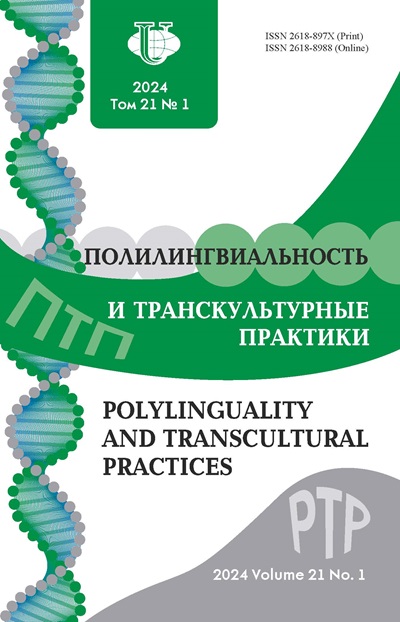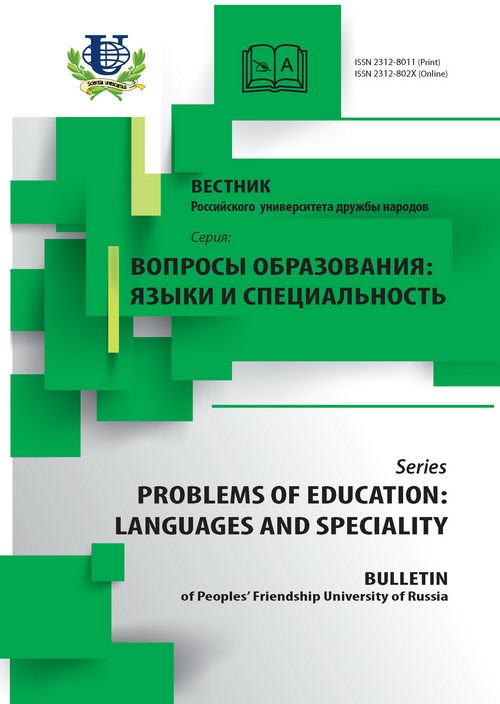No 3 (2015)
- Year: 2015
- Articles: 16
- URL: https://journals.rudn.ru/polylinguality/issue/view/811
Articles
EDITORIAL
Polylinguality and Transcultural Practices. 2015;(3):7-8
 7-8
7-8


MATERIALS OF SOCIOLOGICAL RESEARCHES AS A LINGUISTIC SOURCE
Abstract
The purpose of this article is to research of the mechanism of appearance or disappearance of a component of value in the semantic structure of lexical units - words and word-combinations which are equivalents of words. These lexical units are considered from positions of cognitive linguistics, i.e. in their interrelation with the correlative units of a mental level such as concepts and notions. The possibility of use of sociological researches’ materials as linguistic sources for studying this and some other linguistic problems is proved in the article on concrete examples. Novelty and the scientific importance of work consist in it.
Polylinguality and Transcultural Practices. 2015;(3):9-18
 9-18
9-18


STRUCTURE AND CONTENT OF THE IMAGE EMPIREIN LINGUISTIC CONSCIOUSNESS OF THE MODERN ADOLESCENT (13-15 YEARS): EXPERIMENTAL RESEARCH
Abstract
The article is dedicated to the problem of the influence of the computer games the linguistic consciousness of the modern adolescent. The subject of the research is the changing of the meaning of a word understood as a “subjective content of the sign image”. As a result of conducting a free associative experiment with adolescents aged 13-15 quantitative and qualitative changes were revealed in the content of the associative field of the word “Empire”.
Polylinguality and Transcultural Practices. 2015;(3):19-25
 19-25
19-25


RUSSIANISMS IN LANGUAGE CONSCIOUSNESS OF KAZAKHS(on materials of associative experiment)
Abstract
The article is devoted to the research of Kazakh language consciousness fragment, challenging the influence of the Russian language culture in modern post-soviet area of sovereign Kazakhstan. The article examines the materials of massive free associative experiments (FAE) with representatives of modern Kazakh youths - students of different South-Kazakhstan higher educational institutions fixing the Russian vocabulary elements functioning in Kazakh language consciousness. Using the materials of the Kazakh associative dictionary, the author of the article (one of the dictionary compilers) develops reasoning on materials of dictionary articles of word-stimulus, presenting conceptually essential for any ethnos triad MAN - FAMILY - PEOPLE’S and comes to persuasion, that basic moral and ethical presentations of title ethnos of Kazakhstan correlate with the steady elements of the Russian language culture and contributes to the formation of mankind values and ideals.
Polylinguality and Transcultural Practices. 2015;(3):26-34
 26-34
26-34


WRITING, SHARING AND GROWING: CREATIVE WRITING IN ENGLISH AT A MAINLAND CHINESE UNIVERSITY
Abstract
The teaching of Creative Writing in the Department of English at Sun Yat-sen University in South China has its own particular characteristics. First, to my knowledge, this is one of the very first English Creative Writing courses taught by Mainland Chinese faculty to students for whom English is a second language. Another important factor is that the Creative Writing program at Sun Yat-sen has developed not only as a writing experience, but also as a context for counselling and therapy for students.
Polylinguality and Transcultural Practices. 2015;(3):35-47
 35-47
35-47


A NEW KIND OF TRAINING TEXT - KIBERTEXT
Abstract
The article describes a new kind of educational text, to indicate that the authors use the term “kibertekst.” It is a new organization of the text, the new shaped architecture, a fusion of both verbal and figurative- emotional perception of the world, presented in the text, which was made possible by information technology breakthrough (Internet, cyberspace)
Polylinguality and Transcultural Practices. 2015;(3):48-53
 48-53
48-53


RUSSIAN AND ENGLISH LANGUAGES AS COMPONENETS OF TURKIC-FOREIGN POLYLINGUAL EDUCATION: PRESCHOOL LANGUAGE EDUCATION
Abstract
Article deals with a system of polylingual education in Kazakhstan and Uzbekistan upon the content of state documents concerning language education and linguistic politics; it is described the place and the role of Russian and English languages in the educational system of these countries; it is analyzed the condition of polylingual education in preschool educational institutions; it is mentioned it’s psycholinguistic, lingvocontrastive and sociolinguistic merits and demerits.
Polylinguality and Transcultural Practices. 2015;(3):54-66
 54-66
54-66


AUTHENTIC MATERIALS’ ROLE WHEN TEACHING LAW-STUDENTS PROFESSIONAL TRANSLATION
Abstract
The article touches upon the issue of teaching professional English / Russian translation to law students of non-linguistic Universities. The brief analysis of authentic materials, the principle of their selection and their role in teaching English for special purposes is given here. Analysis of some English language terminology and phrases used in the process of professional communication is made. The importance of students‘ interdisciplinary results and achievements in the process of learning English at non-linguistic Universities is emphasized. Using educational authentic materials content as the example, possibilities of increasing the teaching process’ quality and efficiency, and solutions of linguodidactic, linguistic and methodological tasks are demonstrated in this paper.
Polylinguality and Transcultural Practices. 2015;(3):67-72
 67-72
67-72


DIFFICULTIES OF LEARNING RUSSIAN PREPOSITIONAL CASE FORMS WITH SPATIAL MEANING FOR CHINESE (ON ERRONEOUS MATERIALS)
Abstract
This article discusses methods of expressing spatial relations in Russian language, which are topical for working in foreign lecture-room; outlines the difficulties of learning means and methods of expressing position of act and direction of movement for Chinese students; analyzes the errors in their use
Polylinguality and Transcultural Practices. 2015;(3):73-78
 73-78
73-78


 79-84
79-84


THE PHENOMENON OF POETRY WRITING OF OLJAS SULEIMENOV
Abstract
The article discusses the features of verbal behavior of a famous Russophone Kazakh poet Olzhas Suleimenov. On the example of his usage of stylistic figures (inversion, antithesis, oxymoron), irony, means of expression (similes, metaphors), wordplay (“Nedokapany kapeli! Nedosverleny svireli”), an unusual combination of words, author’s innovations (tyazhkotelo, obekraneny, gusenkolapy) demonstrates creation of a particular style of the author. Factual material is written out from the 4 books of poetry and can serve as a basis for lingual synergetic description of the poetic heritage of the poet
Polylinguality and Transcultural Practices. 2015;(3):85-91
 85-91
85-91


THE PECULIARITY IN THE USE OF PROVERBSIN «THE RED WHEEL», AN EPIC NOVEL BY A.I. SOLZHENITSYN(Knot i «August 1914» and Knot ii «October 1916»)
Abstract
The article deals with phraseological units in the epic novel of A.I. Solzhenitsyn «The Red Wheel». They are analysed according to their role in the contents, composition and image structure of the text. Proverbs and sayings acting as components of the national culture are one of the dominants in the expression of author’s values and his esthetical and ideological position. Phraseology is used as a figure of speech characterizing a person, and also as a special mean of artistic and compositional text organization enabling to create the effect of folk’s regard on the events. Reflecting the most important values for the Russian culture, the phraseological units in «The Red Wheel» are used not only as a kind of summary to the chapter but also reveal the author’s position, united with peoples’ outlook
Polylinguality and Transcultural Practices. 2015;(3):92-96
 92-96
92-96


SCIENTIFIC EVENT FOR THE ANNIVERSARY OF GEORGIY GACHEV IN KABARDINO-BALKARIA
Abstract
The article, written in the genre of Chronicles, devoted to the review of the scientific conference “National images of the world in artistic culture” in Nalchik (October 24-26, 2014). The article target is to acquaint readers with the unique scientific and creative activity of Georgiy D. Gachev.
Polylinguality and Transcultural Practices. 2015;(3):97-104
 97-104
97-104


DAYS OF RUSSIAN LANGUAGE AND LITERATURE AND RUSSIAN EDUCATION IN THE POSTSOVIET COUNTRIES
Polylinguality and Transcultural Practices. 2015;(3):105-111
 105-111
105-111


INTERNATIONAL SCIENTIFIC CONFERENCE «LANGUAGE EXISTENCE IN CULTURE AND SOCIETY-5»MOSCOW, 29-30 MAY, 2015
Polylinguality and Transcultural Practices. 2015;(3):112-114
 112-114
112-114


NAShI AVTORY
Polylinguality and Transcultural Practices. 2015;(3):115-116
 115-116
115-116















